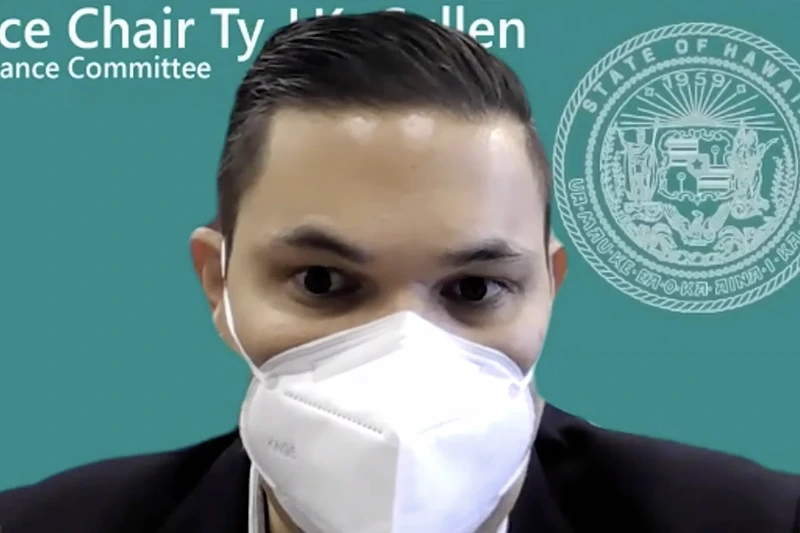
OAN Brooke Mallory
UPDATED 3:52 PM – Friday, April 7, 2023
In a federal corruption case that brought attention to tens of thousands of cesspools that discharge 50 million gallons of filthy sewage daily into Hawaii’s clean waterways, a former Hawaii lawmaker was sentenced to two years in prison on Thursday.
The criminal case against former state Rep. Ty Cullen (D-Hawaii) revolves around cesspools, which are in-ground pits that collect sewage from homes and buildings not connected to city services for gradual release into the environment. In exchange for influencing legislation to lessen the widespread usage of cesspools in Hawaii, he admitted to accepting cash bribes and casino chips.
Due to Cullen’s substantial cooperation with investigators, U.S. District Court Judge Susan Oki Mollway said that she granted him a sentence at the shorter end of the term, as suggested by prosecutors. However, due to the seriousness of his acts, she didn’t go as low as the 15 months recommended by his defense attorney.
“This was a grievous breach of public trust on your part. It appears to have been motivated by greed, and it stretched out over a number of years… I am very concerned that this was not a momentary lapse of judgment,” Mollway said to Cullen.
Cullen admitted full responsibility for his acts and expressed shame before the judge.
“I want to say I’m sorry to my family who stayed by me, to my friends, to my constituents, my community and the people of Hawaii… I will continue to work to make my wrongs right. And ensure that this never happens again,” said Cullen.
The judge also decided to fine the ex-legislator $25,000 in addition to his sentence.
When sewer line investment lagged behind Hawaii’s rapid development in the 1950s, 1960s, and 1970s, hazardous pits proliferated there. Hawaii has 83,000 of these today, which is more than any other U.S. state. New cesspools were only outlawed there in 2016.
Due to the harm they pose to the environment and the possibility of groundwater pollution, Hawaii is now working to get rid of them.
According to Colin Moore, a professor of political science at the University of Hawaii, the public expenditure on such initiatives and the lack of information about the specialized sector might foster an environment that is conducive to corruption.
“That just creates a lot of opportunities because comparisons are so difficult to make, especially in a really small market like Hawaii where there may only be two, or in some cases even one, contractor who can do the work,” Moore said.
A former Senate majority leader and a Honolulu businessman who coerced Cullen with monetary bribes have both entered guilty pleas in criminal proceedings connected to the case.
Cesspools are believed to be present in 16% of housing units in Hawaii, but they are far more prevalent on the Big Island and other more rural islands. They can be found anywhere, including in metropolitan areas just miles from Honolulu’s center, from the coast to the Highlands.
Instead of going into a sewer line and then eventually to a centralized wastewater treatment plant, effluence from toilets and showers in these residences runs through drains into a pit in a yard. The earth, groundwater, aquifers, and ocean then absorb raw sewage with all of its bacteria and pathogens from the pit.
The Legislature has created laws to gradually phase out cesspools in response to these worries.
By 2050, households must either construct more “environmentally friendly” on-site sewage treatment facilities or close their cesspools, according to a state law that was passed in 2017. The most popular on-site option is a combination of a septic tank and leach field, in which bacteria break down sediments inside a tank and a disposal field eliminates wastewater and pathogens while safely reintroducing water to the environment.
The conversion deadlines for cesspools in more environmentally-sensitive areas would be accelerated to 2035 and 2040, under a plan that lawmakers will be discussing this year. A another option would be to start a trial project to upgrade county sewage systems.
Cullen acknowledged accepting cash envelopes in a plea deal for aiding in the passage of a law pertaining to cesspool conversions. For a portion of the time that he accepted bribes, he served as vice chair of the influential House Finance Committee.
Honolulu businessman Milton Choy, who will be jailed next month, gave Cullen a total of $30,000. Cullen also acknowledged taking $22,000 in casino chips from Choy during a trip to a wastewater conference in New Orleans.
According to court records, Choy’s business frequently signed contracts to supply wastewater management services to government organizations and was ideally situated to profit from publicly-funded cesspool conversion projects.
Former Senate Majority Leader J. Kalani English (D-Hawaii) was previously given a three-year and four-month prison term for accepting payments from Choy in exchange for influencing cesspool legislation.
Due to English’s lack of cooperation in comparison to Cullen, prosecutors did not suggest a more lenient sentence than recommended by federal standards, according to Ken Sorenson, the assistant U.S. attorney in charge of that case.
A former Maui County wastewater manager also acknowledged accepting $2 million from Choy in return for directing at least 56 sole-source contracts to his company. In February, he received a 10-year sentence.
The situation has given rise to jokes equating the filthy disposal pits with shady political tactics.
“We were joking that, ‘Oh, now these politicians have given cesspools a bad name,’” said Stuart Coleman, the executive director of Wastewater Alternatives and Innovations, and an advocate for shutting down Hawaii’s cesspools.
Stay informed! Receive breaking news blasts directly to your inbox for free. Subscribe here. https://www.oann.com/alerts

